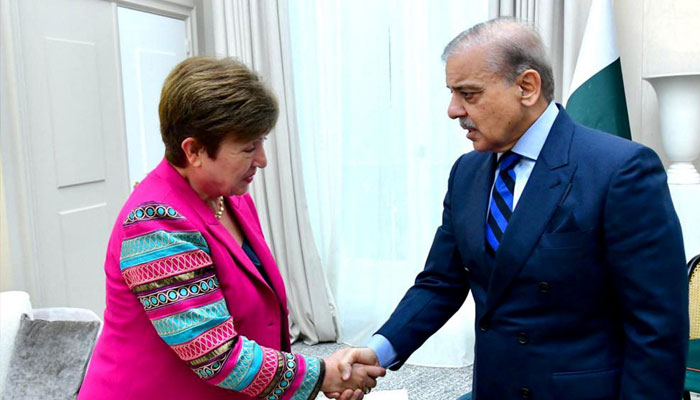A hopeful deal
Prime Minister Shehbaz Sharif expressed his resolve not to give in to tax evaders’ demands
For a resource-starved Pakistan, the news of a fresh $7 billion IMF programme is heartening. Granted, the deal has come with several challenges for people who now have to bear an even heavier burden of taxes. But experts have rightly pointed out that this bailout package will give Pakistan the funds it needs to restructure its institutions needed for a strong economy. During his meeting with the chairperson of the FBR on Sunday, Prime Minister Shehbaz Sharif expressed his resolve not to give in to tax evaders’ demands. He was also rightly irked by ‘surprises’ he received from the institution, which impeded digitization work. It is important for all institutions to be on the same page and work efficiently to resolve the issues. Timely resolution of issues can help bring much-needed reforms in the country. Taxes have always been a problem for most governments with parties fearing that they would lose support if they tried to bring traders or businesses into the tax net. Besides this, the dynamics of the world are also far different from what they used to be. Higher taxes in a country could push people away to countries where tax rates are low. But people’s personal preferences should not come in the way of the government’s financial plan.
Let us assume for a minute that there was no IMF in the fiscal budget picture. Even then, the government would have had to introduce rather strict tax measures to increase its revenue. Pakistan is a poor country with fast-depleting resources, and the leniency shown by authorities towards traders and other private classes led to a shockingly unfair distribution of wealth. Some people in the country have managed to dodge the system to increase their wealth, depriving the country of much-needed tax revenue. The PM and his finance team headed by Muhammad Aurangzeb seem aware of this harsh reality and know that appeasement will not work, and tax evaders have to be brought into the tax net. In his speech given during the presentation of the Pakistan Economic Survey 2023-24 (June 11), Aurangzeb was clear that there should not be any sacred cows. In this context, the PM’s confident statement on his unwavering support for tax reforms and his resolve to not succumb to pressure from tax evaders points to the government’s resolve to fix the system.
Tax breaks and exemptions are a great initiative to create a thriving economy in the country. But when an industry reaches maturity, it is right to ask it to contribute to the national economy. Opposition to tax measures was expected. From traders to industry representatives, almost everyone wants to meet with the prime minister to inform him about their grievances. The PM’s blunt statement hopefully means that no major changes will be introduced to the finance bill to accommodate traders’ demands. The next two to three years are supposed to be tough for almost all Pakistanis. But we hope that this 'almost all' doesn't just mean the salaried class as has been the case till now.
-
 'Euphoria' Star Eric Made Deliberate Decision To Go Public With His ALS Diagnosis: 'Life Isn't About Me Anymore'
'Euphoria' Star Eric Made Deliberate Decision To Go Public With His ALS Diagnosis: 'Life Isn't About Me Anymore' -
 Toy Story 5 Trailer Out: Woody And Buzz Faces Digital Age
Toy Story 5 Trailer Out: Woody And Buzz Faces Digital Age -
 Andrew’s Predicament Grows As Royal Lodge Lands In The Middle Of The Epstein Investigation
Andrew’s Predicament Grows As Royal Lodge Lands In The Middle Of The Epstein Investigation -
 Rebecca Gayheart Unveils What Actually Happened When Ex-husband Eric Dane Called Her To Reveal His ALS Diagnosis
Rebecca Gayheart Unveils What Actually Happened When Ex-husband Eric Dane Called Her To Reveal His ALS Diagnosis -
 What We Know About Chris Cornell's Final Hours
What We Know About Chris Cornell's Final Hours -
 Scientists Uncover Surprising Link Between 2.7 Million-year-old Climate Tipping Point & Human Evolution
Scientists Uncover Surprising Link Between 2.7 Million-year-old Climate Tipping Point & Human Evolution -
 NASA Takes Next Step Towards Moon Mission As Artemis II Moves To Launch Pad Operations Following Successful Fuel Test
NASA Takes Next Step Towards Moon Mission As Artemis II Moves To Launch Pad Operations Following Successful Fuel Test -
 GTA 6 Price Leaked Online Ahead Of Rockstar Announcement
GTA 6 Price Leaked Online Ahead Of Rockstar Announcement -
 Eric Dane Got Honest About His Struggle With ALS In Final Public Appearance: 'No Reason To Be In A Good Spirit'
Eric Dane Got Honest About His Struggle With ALS In Final Public Appearance: 'No Reason To Be In A Good Spirit' -
 Google AI Overviews And Mental Health: Why Experts Say It’s ‘very Dangerous’
Google AI Overviews And Mental Health: Why Experts Say It’s ‘very Dangerous’ -
 Prince Harry Issues A Statement For His 'incredible' WellChild Children
Prince Harry Issues A Statement For His 'incredible' WellChild Children -
 5 Famous Celebrities Who Beat Cancer
5 Famous Celebrities Who Beat Cancer -
 Spinosaurus Mirabilis: New Species Ready To Take Center Stage At Chicago Children’s Museum In Surprising Discovery
Spinosaurus Mirabilis: New Species Ready To Take Center Stage At Chicago Children’s Museum In Surprising Discovery -
 ByteDance Expands Artificial Intelligence Operations In US
ByteDance Expands Artificial Intelligence Operations In US -
 Angelina Jolie’s Breast Cancer Surgeon Appreciates Her For Calling Scars 'a Choice': 'They Are Choices To Survive'
Angelina Jolie’s Breast Cancer Surgeon Appreciates Her For Calling Scars 'a Choice': 'They Are Choices To Survive' -
 Detective Chief Inspector Reveals How Andrew Got Treated In Police Custody
Detective Chief Inspector Reveals How Andrew Got Treated In Police Custody




